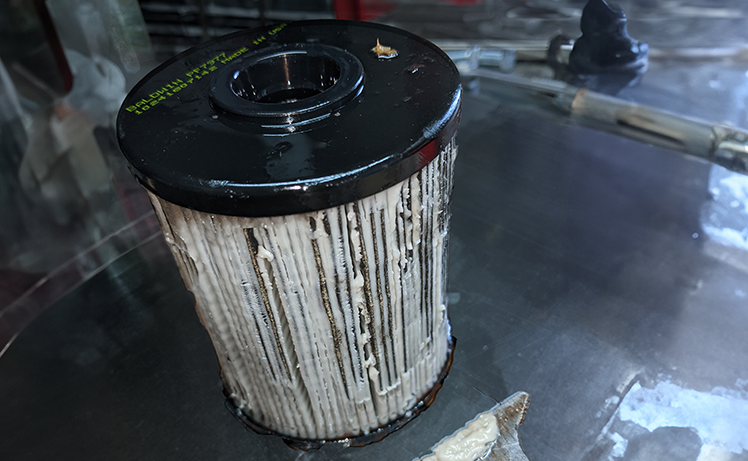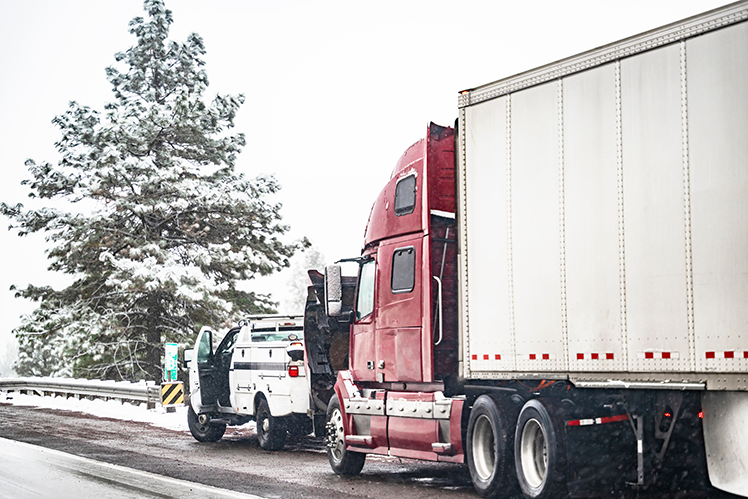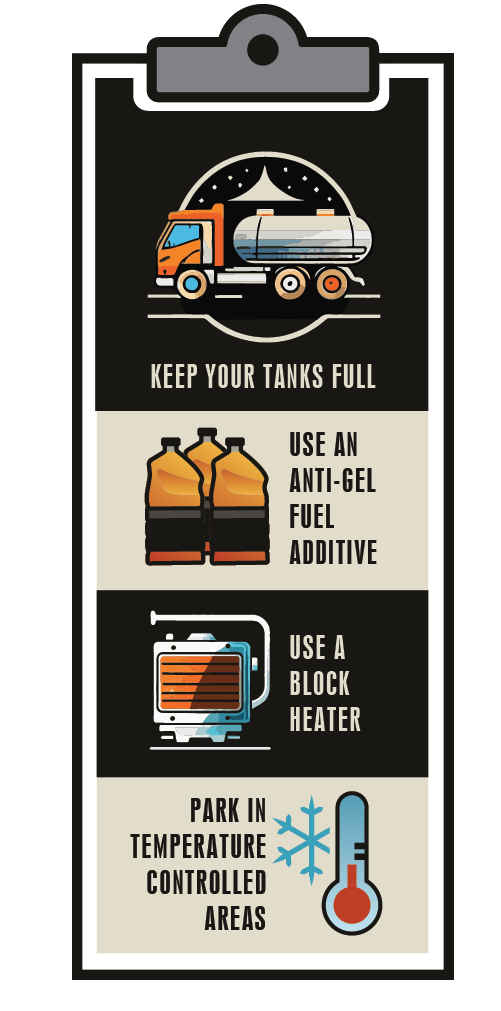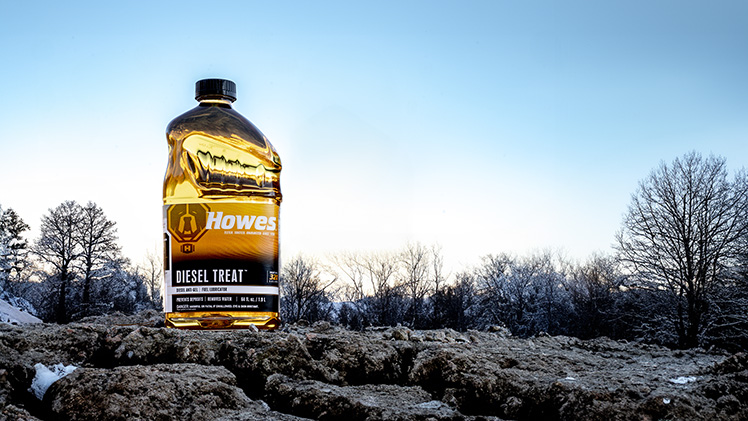
01/15/24
Heavy Duty, Light Duty, Farm, Diesel, Winter, Diesel Fuel
By Erika Howes
Diesel vehicles are usually more fuel-efficient than their gasoline counterparts. Diesel trucks provide massive amounts of torque and impressive towing capabilities. But due to the chemical makeup of diesel fuel (it contains paraffin, a natural petroleum-based wax), it can easily gel at temperatures below 32 degrees Fahrenheit.
Gelling at 32 degrees is rare but gelling at 10-15 degrees or colder is quite common. Therefore, if you’re a diesel driver, it’s best to use diesel additives and follow diesel winterization best-practices carefully to avoid getting stranded curbside in the cold this winter.
Diesel fuel is made up of a complex mixture of hydrocarbons and in the winter months, wax particles within the fuel react to cold temperatures. The reaction starts when diesel hits its cloud point, the point at which wax crystals begin to form, and the fuel becomes visually cloudy. While this can begin at temperatures as high as 32 degrees, the average cloud point for #2 diesel fuel is around 20 degrees.
As temperatures continue to drop, the diesel approaches its pour point, the coldest temperature at which it can flow before freezing. This occurs when the waxes in the fuel bind together. At what temperature does #2 diesel fuel gel? This generally happens between 10 and 15 degrees, even if you are using winter fuel that is pretreated at the pump.
Diesel fuel is affected by actual temperature only. While the wind chill may make the human body feel colder, it has no effect on your fuel. What will make a difference is the type of diesel fuel inside your tank. From winter diesel blended with kerosene to biodiesel blends, each type reacts differently to the cold.
While diesel fuel gelling at 32 degrees is rare, it could happen depending on the quality and make-up of the fuel. The higher the paraffin wax content in the fuel, the more likely it is to gel at higher temperatures. A prime example of this is blended fuel. Some biodiesels can begin gelling at temperatures in the low 50s. If your diesel has a high biodiesel blend, you are at risk of your diesel fuel gelling far sooner than you may expect.

Other factors may affect your fuel flow sooner rather than later. If you have a summer fuel blend in your tank, it is less prepared for the cold weather you may face. Winterized diesel may contain a mix of #1 diesel (made with kerosene) and #2 diesel, which can protect your fuel in much lower temperatures. Jet fuel, for example, is a refined kerosene-based fuel that is able to handle the sub-zero temperatures it experiences at high altitudes. However, kerosene can wear out the fuel pump and cause other issues, so using high amounts in diesel engines is not recommended.
Regardless of the temperature, anytime you experience diesel fuel gelling, you can face a world of problems. If your diesel vehicle has been sitting, you may have cold start issues. Gelled diesel can make it difficult if not impossible to start diesel engines.
If you are already on the road, as your diesel thickens, you will experience reduced fuel flow through your fuel lines and injectors. This can result in poor engine performance and can also potentially damage the fuel system.

Even if the diesel engine is on, the fuel tank is located at a distance and won’t necessarily be affected by the heat the engine gives off. So, though you may not expect it, diesel fuel can actually gel while you’re driving.
If this happens, you will start by experiencing engine power loss. As the engine receives less fuel, you will have reduced power, poor performance, and lower fuel efficiency. In severe cases of gelling, your engine may stall altogether, leaving you stranded in the cold.
Knowing all the issues that go along with gelled diesel fuel, it’s crucial to take steps to prevent this problem. Wondering how to keep diesel from gelling? There are several ways. Let's explore a few.

First, keep your fuel tanks full. This reduces the air space inside the tank and helps to minimize condensation that can lead to frozen fuel.
Next, whenever possible, try to park in a temperature-controlled environment. This will help in preventing cold start issues. A heated garage is a great option if you have access to one.
If a heated garage isn’t available, a space with a power source will allow you the opportunity to use a block heater. Using this will help save on fuel economy and extend the life of your engine parts. Plus, you never need to run one for more than four hours.
There are pieces of heating equipment that can help in the fight against gelling. Glow plugs are an option. A glow plug is a heating element that warms up incoming fuel and air to support efficient fuel combustion in your diesel engine.
Another option is to install fuel heaters. Often integrated with fuel filters, fuel heaters can heat the fuel before it reaches the engine. These will help prevent gelling in the fuel lines and filters.
At the end of the day, one of the easiest ways to prevent diesel fuel from gelling is by using a quality diesel fuel additive. While some diesel winter blends may contain an anti-gel additive, it is hard to know the quality and amount that they carry. Your best bet is to add a product that protects your diesel from gelling, removes water to prevent icing, and contains absolutely no alcohol.

Howes Diesel Treat is North America’s number one selling anti-gel and fuel conditioner. While preventing gelling, Diesel Treat will also help add lubricity to your fuel, prevent injector deposits, and provide you with more power for smooth acceleration and increased fuel economy, even with heavy loads. Petroleum-based and made with no alcohol or harmful solvents, Diesel Treat is warranty-safe and effective in all diesel and biodiesel blends. Plus, with Howes Diesel Treat, you can rely on the 100% No Gelling Guarantee – You Go or We Pay the Tow!
By understanding the dangers of diesel gelling, you can take measures to prevent it, ensuring the reliable performance of your diesel-powered vehicle. Take the steps to winterize your diesel today and avoid being stuck in the cold when temperatures drop.